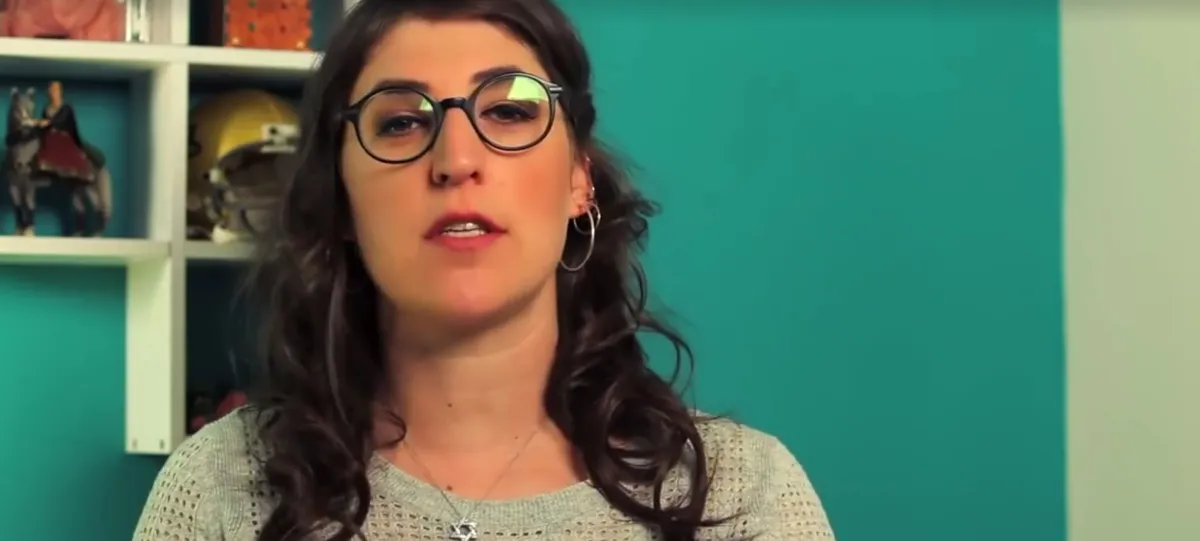As someone who loves science and also believes in a Higher Power, it is often difficult to be in conversations with people who lean more heavily in one direction or the other. I’ve spoken with scientifically-minded folks for whom the concept of “God” is unnecessary. I’ve spoken to religious folks for whom the question of “why?” is infinitely more important than the question of “how?” In this video, actress and scientist Mayim Bialik discusses how the two coexist for her.
She starts out by explaining what God is not to her (a bearded old man in the sky granting wishes) and what she doesn’t believe about God (no, God doesn’t grant you a parking spot if you believe hard enough). Then, Bialik describes what God is to her, calling God “the force in the Universe that drives all of the phenomena that we experience as human beings,” and goes on to talk about valuing the experience of herself as a spiritual person (not just a physical or mental one) and the good things (like discipline and boundaries, which all people need to learn in order to relate to each other) religion, specifically Judaism, has provided for her.
Watching this video, I felt like I was watching a broadcast from inside my own head.
I grew up Catholic, and yet science and religion were never mutually exclusive in my house. Even as I participated wholeheartedly in my church doing everything from singing in children’s choir, to being a leader of song, to being a lector, I also loved science so much that, when I was a kid and my dad had to fight with me to go to bed at my bedtime, he’d say “How do you expect to be an astrophysicist if you don’t get enough sleep?”
Note: I had exactly zero plans to become an astrophysicist, as math bored me to tears. However, I totally ate up (still do!) the work and findings of actual astrophysicists, and it jazzes me to no end.
Once I got to high school and college, I began encountering a number of peers who were avowed atheists, and would proceed to belittle those with religious beliefs around me. It was never anything outright, but there was always the underlying implication that people who believe in God are stupid, naive, or both and are to be humored like children.
It was annoying, because very often I’d want to engage in conversation about science, and have to ignore this attitude about something that I considered a deep part of my identity, just to keep the peace, or to keep the conversation focused. To say nothing about the conversations I’ve had with Creationists that would always end with me helplessly saying something like, “But there are fossils, though…” as I looked into the eyes of someone who refused to believe things that had been studied and discovered by others for centuries.
For many who value science over religion, the argument would be that, rather than answering questions about the natural world with “because God,” a scientist will work to find the answers. I think religion is just as much of a search as science is. And just as science has theories that it treats as more-or-less fact despite only being 98% sure and not 100% sure, religion prescribes certain behaviors, attitudes, and beliefs based on people’s lived experiences. Granted, there are people who take those things as unshakable fact, but I think that for most people faith is all about having faith in spite of not knowing, rather than believing one knows. You know?
Someone who values science over religion might emphasize “evidence” as the key difference between a scientist and a religious person. I think to someone who has experienced something spiritual in their lives, that’s as much “evidence” as observing something outside of oneself. It’s always been interesting to me how some might accept one form of exploration and searching “the scientific method” but the other “interpreting emotions” as if those are two different things. Isn’t the scientific method interpreting data? It’s looking at things and then, based on everything you’ve learned before, and what you’re seeing now, drawing conclusions? I don’t see those two things as different. To me, they’re both looking for answers, and using whatever tools are at one’s disposal to find them. It just so happens that, when looking at things spiritually, the tools are internal, rather than external.
It’s like that moment in the film Contact: “Did you love your father?” “Yes.” “Prove it.” Jodie Foster’s character knows her love exists, because she’s experienced it and knows it’s there. As for whether someone trusts or accepts that as “concrete” enough evidence is out of her hands, but that doesn’t make her love less “real.”
To get super-nerdy for a second, and I’ve written about this before, I’ve always related my thoughts about God to the Prophets on Star Trek: Deep Space Nine. In the wormhole, these beings exist that experience life outside linear time. To the Bajorans, they’re The Prophets – basically Gods that help them through their lives. To the Federation, they’re the “wormhole aliens” who simply exist outside linear time. There’s no question as to their existence, the question is “What are they?” That depends on perspective and history.
So, to me, the question isn’t “Does God exist?” or “Do you believe in God?” but “What is God?” Whatever exists exists whether we want to believe in it or not. It’s all about identifying what’s behind the Universe and giving it a name. Science and religion just come at that question from different angles.
And sure, the label “God” might make some people uncomfortable. That’s cool. No one knows whether the Universe is held together by one force, or many forces, or even if it’s held together at all (or is this all a Matrix-like illusion?), but clearly the Universe is bigger than us, and operates under certain rules. Chemicals work a certain way. Energy works a certain way. Etc, etc. “God” is the name some people give whatever’s responsible for that, as well as to its purpose. It’s about how and why.
And some people don’t need to know why, or don’t see the value in asking why. That’s cool, too. However, I was always the kid who asked “but why?” until people got sick of me, so…that explains that.
As I got older, my beliefs around God changed, but even when I was the most practicing Catholic ever, I approached my faith as what I always refer to as “a God-leaning agnostic.” It’s the reason why now, I’m drawn to Judaism, and why I’m planning on converting. Judaism is basically all about “The fuck if I know the answers, but here’s how I’m going to live my life while we wait to find out what the deal is.” It fits kind of perfectly with my God-leaning agnostic self.
So, I guess that’s something that Bialik and I have in common.
(image: screencap)
Want more stories like this? Become a subscriber and support the site!
—The Mary Sue has a strict comment policy that forbids, but is not limited to, personal insults toward anyone, hate speech, and trolling.—
Follow The Mary Sue on Twitter, Facebook, Tumblr, Pinterest, & Google+.









Published: Apr 3, 2017 05:40 pm